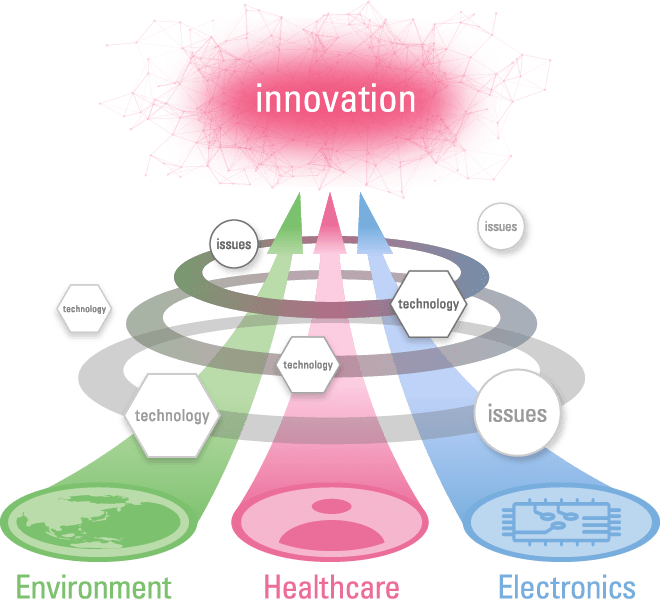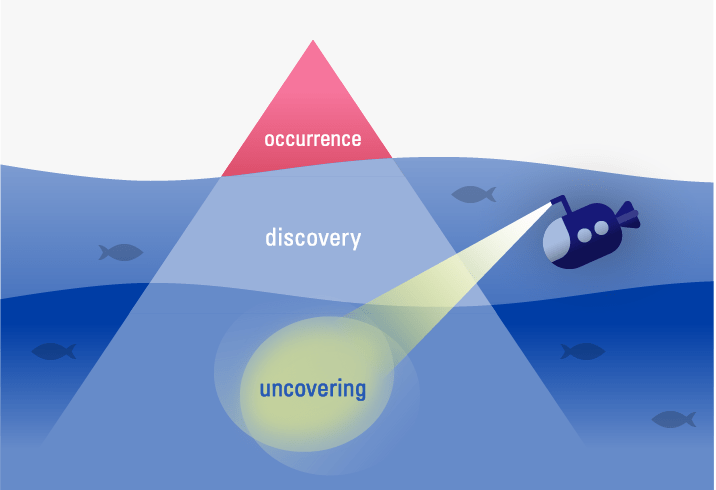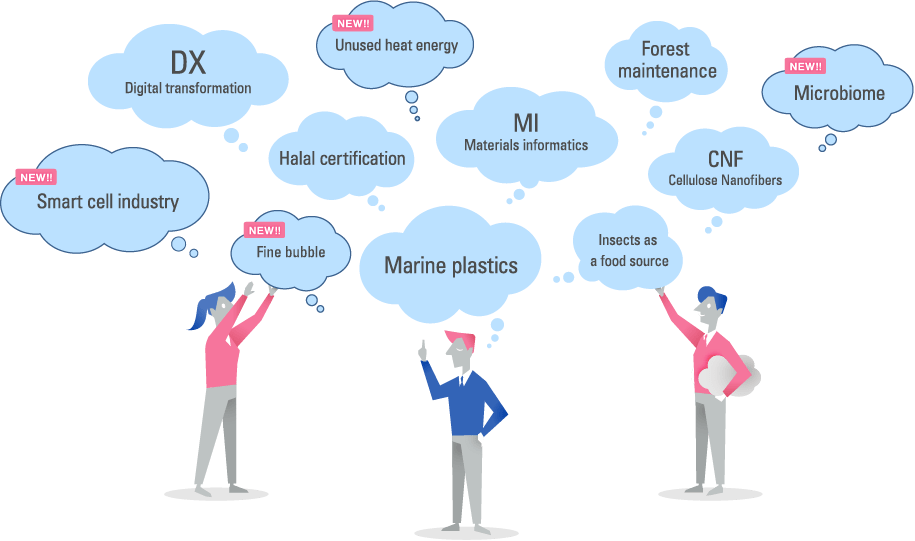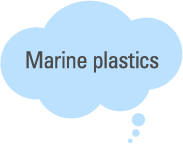The innovation strategies of KH Neochem
KH i-Lab aims to innovate based on the three strategic domains— Environment, Healthcare, Electronics—set forth in a statement of KH Neochem's ambitions by 2030, entitled VISION2030. On top of that, through research activities that emphasize the characteristics of each member, we seek to create new businesses by tackling a wide range of social issues and integrating technological development through open innovation.

WROC strategy
At KH i-Lab, we advocate exploratory activities that emphasize the characteristics of each member, such as their own interests and specialties, and what they want to be by 2030. We call this the WROC (Wide Range Operation with Curiosity) strategy—we proceed with research activities that are sparked from individual curiosity.
Social issues that we envision
It is incredibly difficult to predict the future. In that process, we categorize and target social issues that may arise in the future—from global-scale issues (megatrends) to niche issues that customers or consumers might possibly have. Among these issues, some have already occurred; some can be discovered by exploration; and some can be uncovered by investigating deeply into phenomena, then repeatedly proposing and testing temporary hypotheses. Through our research activities, we are working to uncover a wide range of social issues and to create forms of business that will lead to their solutions.

The open innovation we aim to
In today's market, where the external environment is subject to rapid changes, quick development is essential. In addition, in a highly complex society, the level of technology demanded must necessarily increase. To meet these demands, it's essential that we make optimum use of untapped resources that lie dormant within our company, other companies, academic institutions, etc., without clinging to the notion that we must develop the technology ourselves. For this reason, we aim to create new business through open innovation.
Seeds of ideas
The seeds of ideas obtained from social issues and technology seeds are accumulated as knowledge by KH i-Lab. Moreover, unexpected stimuli may cause these seeds to sprout. We hope that sharing knowledge with you all generates opportunities for co-creation.
Halal certification
It's essential to eliminate inequalities caused by individual attributes such as race, gender, religion, and so on. The halal certification system supports Islamic restrictions and helps reduce interreligious inequalities.
Forest maintenance
Forest industry in Japan is on the decline, due to cheap and high-quality imported timber. It is not wise to neglect forest maintenance, which is so essential for building a resilient nation. In order to revitalize forest industry in Japan, we need to approach the issue in various ways.
Marine plastics
When plastics, which do not decompose in the natural environment, are illegally dumped, they eventually end up in the ocean. These plastics have adverse effects such as harming marine life and destroying the landscape.
Insects as a food source
It is expected that food will be in short supply in the future, due to the effects of population growth and climate change. By sourcing food from insects, which grow with great energy efficiency, we can seek to ensure more efficient protein intake.
CNF: Cellulose Nanofibers
Cellulose, a component of plants, is broken down and processed into nano-sized fibers, which are called CNF. It has five times the strength of iron at one-fifth the weight, so there are great expectations of CNF as an ideal material.
Unused heat energy
In the process of energy conversion, a large amount of energy loss occurs in power plants and factories. In particular, it is difficult to recover and use waste heat in the low temperature range of less than 200 degrees, and effective use of the heat has not been progressed. For saving energy, it is indispensable to make effective use of the waste heat.
DX: Digital transformation
DX is the term for when a company uses IT to transform its existing business model, its organization, or even its corporate culture. Utilizing data and IT is essential for responding to modern markets where the business environment is subject to rapid change.
Smart cell industry
Material production with cells controlled by cutting-edge biotechnologies is being studied. If we can integrate biotechnology into our chemical technology, we may be able to create new values in various industrial fields.
Fine bubble
Fine bubbles are small bubbles in a liquid with a diameter of less than 100 μm, and they are beginning to be applied to various fields such as washing, agriculture and fisheries, food processing and machining. By combining fine bubbles with chemical engineering, they can contribute to energy saving and reduction of environmental load.
MI: Materials informatics
By using information technology, materials development that explores the prediction of physical properties and the optimization of composition is progressing to levels where human skill alone cannot reach. Efficient research and development that does not rely solely on experience is required.
Microbiome
There are trillions of bacteria on human skin. Among them, the localized bacterial group is called the microbiome, and it is said that it is related to the symptoms such as acne and atopic dermatitis, and skin type. We are thinking about whether it is possible to control the microbiome through the power of chemistry.
Please contact us using the below information.
4F, AIRBIC 7-7 Shinkawasaki, Saiwai-ku, Kawasaki-city, Kanagawa 212-0032, Japan
TEL: 03-3510-3600
email innovation@khneochem.co.jp













